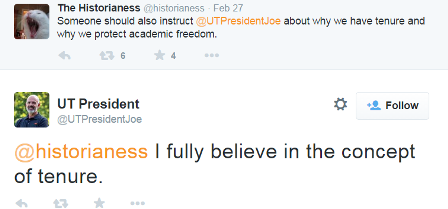You have /5 articles left.
Sign up for a free account or log in.

Joe DiPietro
U. of Tennessee
It was there and then it wasn’t: the University of Tennessee System’s plan, announced in a news release, to “de-tenure” some faculty members as part of its new cost-savings strategy. While the university has backed down on that specific language amid faculty outcry -- focusing instead on a “comprehensive review” of existing tenure and posttenure review processes -- some Tennessee professors say any plan by any name to strip professors of tenure, especially one linked to financial, not academic issues, smells sour.
The “de-tenure” idea was proposed last week after Joe DiPietro, system president, outlined the framework for a new financial model to the Board of Trustees for the university system's five campuses.
“We are not insolvent or in financial ruin,” DiPietro told the board. “The only way to preclude tuition increases is to fix it ourselves. It is about maintaining quality and moving ahead. We will be a different organization in the next four to five years.”
The president outlined six major steps the university would take to achieve those goals, including program realignment and consolidation, reallocation of resources, reviews of tuition structures and unfunded mandates for tuition waivers and discounts, and a new, more "effective" posttenure review process.
“The last item on the list which will be led by the system is to take a look at tenure and posttenure review process and it will be conducted by us at the system level,” DiPietro told the board. “This will be a review and make recommendations on needed revisions regarding posttenure review. I would like it to include adjustments for compensation for high performers in that postreview time frame and also to look at policy for termination based on unsatisfactory performance."
He continued, “I will do this in concert with the [system-wide] Faculty Council and a group of people. We will keep them tuned in. But the reality is the posttenure review processes that we currently have from the standpoint of the [cumulative performance review] program is not very effective.”
Those comments alone set off some warning bells for faculty members -- such as why the university would keep a faculty body “tuned in” to a process that by shared governance norms would be faculty driven.
But the way the president’s comments were soon summarized in a university news release was a bigger red flag for faculty: "Tenure and posttenure review process: To be conducted by [Tennessee] System Administration and with involvement by the Faculty Council, to look at awarding of tenure, posttenure compensation and enacting of a de-tenure process."
Chad Black, an associate professor of history at the University of Tennessee at Knoxville, attacked the idea in his personal blog, asking, “What in the world is a ‘de-tenure process,’ and what place does tenure, a bulwark of academic freedom and security for the risks of academic training and employment, have in a conversation on cutting costs and increasing revenues?”
Responding to the president’s comments in full, Black said, “So, here we have it. In a move that I don’t know any faculty were forewarned of, DiPietro has opened the door for the Board of Trustees to undo the protections of tenure at the University of Tennessee.”
Some faculty members also criticized the plan on Twitter. One user tweeted criticism of the plan at DiPietro, to which he responded: “I fully believe in the concept of tenure.”

On Monday, the university issued a what it called a “correction” to the news release, saying it had deleted “the inadvertent and incorrect reference to ‘de-tenure.’” The relevant section of the new release reads: “Tenure and posttenure review process: The [Tennessee system] administration, with involvement of the Faculty Council, will conduct a comprehensive review of the university’s established tenure and posttenure review process.”
Via e-mail, Gina Stafford, a system spokeswoman, reiterated that the “de-tenure” reference was a mistake. Regarding the tenure policy review process, she said the university administration, “with involvement by the [Tennessee] system-wide Faculty Council (represented by leadership of faculty senate organizations on every campus), will conduct a comprehensive review of the university’s established tenure and posttenure review process.”
Stafford said the plan is preliminary, and that little other information was available. “All that’s possible to say now with certainty is that Dr. DiPietro will be reaching out to faculty leaders and administrators with every [Tennessee] campus and institute to determine how to proceed with this study.”
Candace White, associate professor of public relations at Knoxville and chair of the Faculty Council, did not immediately respond to a request for comment. But there is, of course, a difference between “reaching out” to faculty members on the council and letting them lead the process, as professors do regarding faculty matters on many campuses, as per guidelines established by the American Association of University Professors.
AAUP’s Statement of Principles on Academic Freedom and Tenure says that tenured faculty members may be terminated for just three reasons: program elimination, financial exigency and cause with due process.
Henry Reichman, the association’s chair for academic freedom and tenure and a professor emeritus of history at California State University at East Bay, said via e-mail that in all three cases, “our policies prescribe clear and specific mechanisms designed to guarantee fairness and due process. We do not recognize ‘termination based on unsatisfactory performance,’ unless such performance is defined as simply synonymous with our understanding of cause, and if the faculty member is provided full academic due process, and the burden of proof is on the university, not the faculty member.”
Reichman said that posttenure review can be a “useful tool for improving faculty performance, if employed constructively. However, if posttenure review becomes, in effect, a reappointment review, then it amounts to nothing less than abandonment of the tenure system.” While much remains to be seen in how the program eventually is implemented, he said, it’s “troubling” that it at least appears it will be led by the administration and is motivated by saving costs.
If the administration is looking to get rid of the highest-paid, more senior faculty, he said, “Clearly educational quality will take a back seat along with faculty rights.”
Black expressed similar concerns, saying he thought the “de-tenure” language was more of a show of hand than a typo.
“I think that the original language expressed the intent of the proposed review of the established posttenure review process,” he said. “I think enhancing the ability of the university to fire people with tenure is problematic no matter what it is called.”
Mary K. McAlpin, a professor of French at Knoxville and head of the campus's AAUP chapter, said there were a "lot of people upset about this -- and talking about it." Via e-mail, McAlpin said it was hard to imagine what DiPietro hoped to change about the existing posttenure cumulative performance review, since it already allows deans to veto the positive recommendation of a faculty committee charged with investigating a professor who's been cited for unsatisfactory performance twice in a five-year period.
In other words, she said, "If a department head wants to get rid of a faculty member and the dean goes along with it, that person is out even if their colleagues find that their performance is satisfactory."





